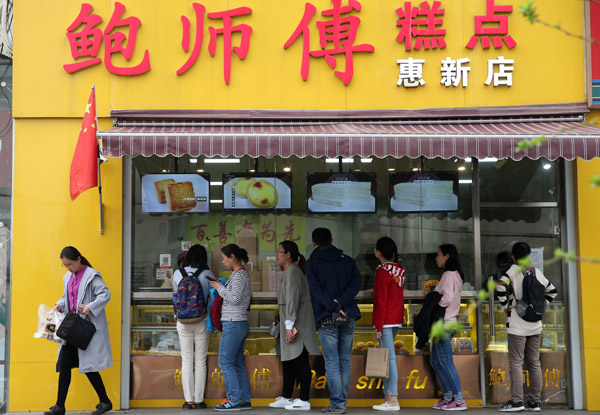Pain in the buns for baker
By Zhang Yangfei | China Daily | Updated: 2018-03-29 09:12
Jiangxi shop keeper is forced to defend his trademark after expanding business in Beijing

When Bao Caisheng carried both his luggage and baking dream north to Beijing 14 years ago, he couldn't have known that his little bread business would turn into a yearlong, nonstop trademark battle.
Born in Zixi county, Jiangxi province-known to some as the hometown of Chinese bread-Bao started learning the bread craft at a young age from his parents, who gave up their fishing business in Zhejiang and moved to Zixi after falling in love with baking.
Beijing, however, is no small town with a handful of bake shops. In order to stand out in a forest of modern, well-decorated boulangeries and patisseries, Bao decided to go simple.
In 2004, he opened his first little bakery near a university, selling palm-sized buns topped with a floss of dried meat and filled with custard as the signature item, together with other old-school breads and cakes.
The nostalgic taste soon earned the buns a phenomenal reputation and by the end of 2008, Bao had three bakeries under the name Master Bao (Baoshifu). The stores were as simple as the products, with only a serving window for customers, but the kitchen and preparation processes could be viewed through a large glass wall.
"I would like my customers to feel that the quality of our products is guaranteed," Bao said.
The bakery continued to attract people and soon sparked a food craze. Bao then officially registered the trademark Baoshifu in 2013 and when he opened his first bakery in Shanghai, local people would wait as long as four hours just for one signature meat-floss bun.
Trouble came with fame. While Bao was busy running his floury kingdom, counterfeits began to pop up. Bao said he has only 14 branches across Beijing, but a total of 263 bakeries can be found on an online Beijing map if you type in the bakery name.
"Sometimes I almost wish my bakeries were not so successful," he said. "I just wanted to bake delicious buns for customers and never thought infringement could be so rampant."
"Those fake stores look exactly the same as mine. Even I can't tell the difference," he added.
Recently, the Beijing Administration for Industry and Commerce busted 33 fake bakeries in the city that failed to provide a valid trademark or authorization, but the battle is intensifying.
Early this year, Bao decided to sue his biggest rival, Beijing Yishang Food Management Co, for trademark infringement, alleging it has opened more than 200 franchised stores in Beijing and hundreds more across the country under the Baoshifu name.
According to Bao, Beijing Yishang attempted to visit his Shanghai store in March last year but was turned away, before it bought a Baoshifu trademark a few months later from a person named Bao Haibin, whom Bao Caisheng said he doesn't know.
Beijing Yishang wouldn't comment on the matter, and an employee hung up the phone when China Daily asked for more details.
However, Beijing Yishang forwarded an article from Toutiao Media via WeChat, saying that even though the two trademarks may sound the same, the new Baoshifu trademark was registered in a different category.
According to information provided by the Trademark Office of the State Administration for Industry and Commerce, Bao Caisheng's company holds the trademark under Category 30 which refers to "cakes and bread", and Beijing Yishang holds one under Category 43 which deals with "restaurants and beverage service".
"But the usage of a trademark is also a very important judging point," said Zhou Yixia, a plaintiff 's lawyer from Beijing Xinjiulong Intellectual Property Agency.
"None of Yishang's franchised stores provide any form of restaurant service, so that alone makes their trademark invalid."
To help customers find the original pastry, Bao Caisheng listed the location of all his 14 bakeries on the official WeChat account and receipts, but customers are still highly likely to be misled, as the original stores are far outnumbered.
"I can never tell which store is real and which is a fake by the look," said Lin Fengqing, a frequent customer of Master Bao bakery.
"But I can tell which one tastes better. The buns from the real Master Bao are smaller and topped with more and crispier meat floss, which tastes far more delicious."
The trademark battle Bao Caisheng is fighting is not easy.
"Thankfully the government is reinforcing the protection of intellectual property," he said.
"But I still hope that authorities can make bigger efforts to root out counterfeits and become the strongest backup for us individual entrepreneurs."
Zhang Yangfei contributed to this story.
























